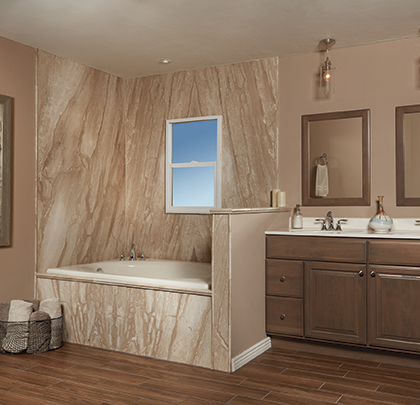Remodeling commercial bathrooms in places like university and college dormitories, public housing, hotels, and in assisted and long-term living facilities involve many complex decisions and steps. For this reason, many general contractors choose to hire subcontractors for these large-scale projects. Selecting a partner to handle part of the renovation allows them to focus their time and labor on other aspects of the project.
However, choosing the right subcontractor for large-scale bathroom remodeling projects can be a daunting task, as the wrong choice can directly affect the completion of the project in time and the allocated budget.
THE CHALLENGES
While bathroom remodeling subcontractors abound, there are many industry-specific considerations that are best served by those that already have extensive experience working with multiple-unit remodels. These concerns include reducing or eliminating construction noise, and handling noxious odors or dirt/dust than can disrupt the building’s residents. The work must leave a lasting impression while, at the same time, be completed within budget and as quickly as possible to return all bathrooms to service to occupants.
In addition, there are economies of scale. Because renovation is typically completed in blocks of bathrooms, installers that regularly service commercial and community housing can often provide better pricing on items—such as acrylic bathtub liners—than those that primarily serve the residential home market. For example, while local companies may charge up to $1,000 for an acrylic bathtub liner, a more established company can usually offer half that price.
THREE OPTIONS FOR A SOLUTION
Bathroom remodeling can involve several projects, but the bathtub is always a key component. When it comes to updating a worn-out bathtub, three options are available, all varying in cost, labor, and potential for guest disturbance: replacing, refinishing, and relining.
Replacing: Replacing an old bathtub is an expensive, labor intensive, and time consuming project that often involves demolition and damage to the surrounding walls and floor finishes. Water supply lines and pipes may also need replumbing. For all these reasons, bathtub replacement is rarely an option.
Kelly Bennett, a general contractor who recently was the project manager responsible for the complete renovation of a 3-story dormitory for the Department of Homeland Security, including 78 bathrooms, understands why bathtub replacement usually is the last option to consider. “If you can remodel a bathtub without having to demolish all the existing plumbing, you’re going to save a lot of time, especially on a large-scale project like this one.”
Bennett explains that replacing a bathtub, especially one with ceramic tiles installed on the wall surrounds, is not cost effective because of the high rebuilding cost.
In addition, replacing a bathtub can take several days and can be extremely noisy and dusty, often leading to complaints from building residents.

Refinishing: A second option involves the refinishing, or re-glazing, of the existing bathtub. The process includes sanding the current coating, filling chips with epoxy, followed by coating and polishing. While this option costs less than a full replacement, it can take several days to complete.
In addition, although re-glazed bathtubs look beautiful, the finish may only last a few years as it can get scratched easily. Another downside is the obnoxious odors released during application. Even with all the proper processes and ventilation, the smell can linger for several days.
Relining: The third option is to use an acrylic bathtub liner installed on top of the existing bathtub, therefore creating a new bathtub surface that can last for decades. Made from durable materials, acrylic bathtub liners feature high gloss, minimal porosity, and excellent scratch resistance—all of which simplifies cleaning.
Installation is a critical aspect with any acrylic bathtub liner. Some manufacturers, such as American Bath Remodeling, have developed their own proprietary and patented installation process to ensure a complete, watertight fit. The Scottsdale, Arizona-based company has been serving the hospitality, commercial and community housing industries for almost 40 years and has remodeled more than a million bathrooms over that span.
Kelly Bennett explains that, for the large-scale bathtub remodeling project he was involved with, using American Bath acrylic bathtub liners made the process a lot simpler and faster.
“The installation went very well overall,” says Bennett. “The installing team put the bathtub liners right over the existing bathtubs and the ceramic tiles on the wall surrounds. I’d seen acrylic bathtub liners before but this was the first time I used them.”
“I was very impressed with their finish and how great they look,” adds Bennett. “After completion, the government was very pleased with the material choice, the pricing, and the installation.”
Because the acrylic bathtub liner comes pre-fitted, installation takes less than 2 hours. With no drying time required, the bathtub can be used almost immediately after installation. Of all the options, relining a bathtub is the least disruptive and the fastest solution to bathtub remodeling. This type of acrylic bathtub liners is very durable, easy to clean and maintain, and can last for several decades before it needs replacing.
CONCLUSION
As with any renovation project, bathroom remodeling requires thorough planning, as well as selecting a reputable contractor with extensive experience in the commercial and community housing industry. Building owners need to take into consideration the scope of the work involved and the many options available for materials and components, while adhering to budget limits, minimizing resident disturbance, and completing the renovation project as quickly as possible. ■
For More Information:
For more information contact American Bath Remodeling, call 888.826.2284, or visit www.ambath.com.
_________________________________________________________________________
Modern Contractor Solutions, July 2017
Did you enjoy this article?
Subscribe to the FREE Digital Edition of Modern Contractor Solutions magazine.

Commercial Property Bathroom Remodeling Challenges


